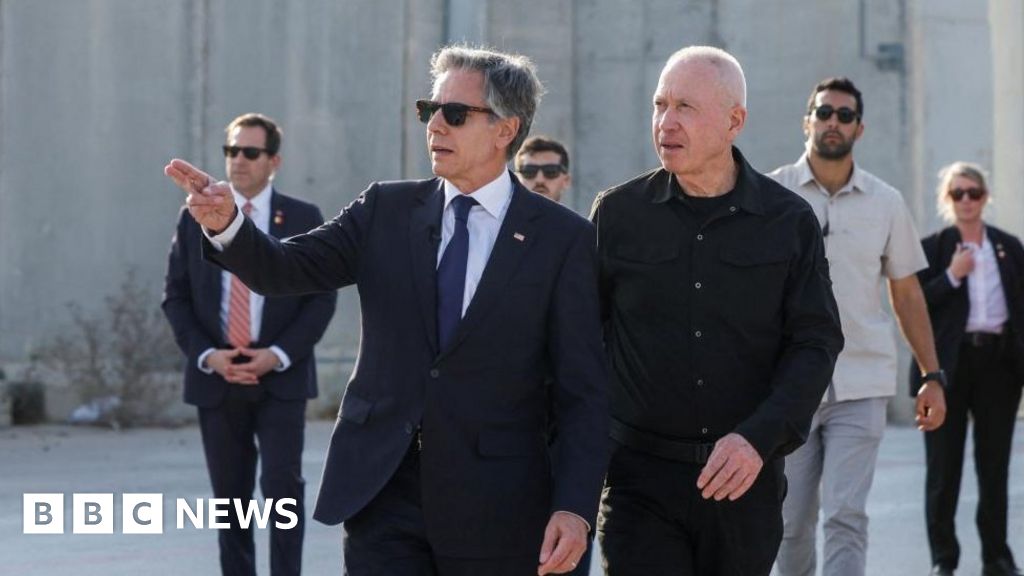
US Secretary of State Antony Blinken told Israel and Hamas that “now is the time” to reach a ceasefire agreement in Gaza and release the remaining hostages held there.
Blinken said that there is an agreement on the table and Hamas must agree to it.
The mediators are awaiting Hamas' response to the latest proposal.
The agreement reportedly includes a 40-day ceasefire and the release of more than 30 Israeli hostages in exchange for the release of several Palestinian prisoners.
Blinken said during his meeting with Israeli President Isaac Herzog in Tel Aviv: “We are determined to reach a ceasefire that will bring the hostages home and return them now, and the only reason this is not achieved is Hamas.”
“There is a proposal on the table, and as we said, there are no delays and no excuses. The time is now.”
A senior Hamas official denied that the movement was responsible for the delay in reaching a new agreement.
Families of the hostages were demonstrating outside and were greeted by Mr. Blinken, saying the release of their loved ones is “at the heart of everything we are trying to do.”
The fate of about 130 of the 253 hostages kidnapped by Hamas during its unprecedented attack on Israel on October 7 remains unknown. At least 34 of them are presumed dead. The rest were released or rescued.
The top US diplomat later visited the Israeli port of Ashdod, about 30 kilometers (20 miles) north of Gaza, where he insisted that Israel had made meaningful concessions to reach an agreement on the hostages and a ceasefire.
Blinken said that Israel has made progress in getting more aid into Gaza, but there is a need to accelerate this given the huge scale of needs.
Ashdod was recently opened to aid shipments heading to Gaza, with the United Nations warning of severe food shortages and looming famine.
The Israeli army announced on Wednesday that 30 trucks loaded with humanitarian aid from Jordan entered the northern Gaza Strip for the first time through the Erez crossing.
Blinken also reiterated the American position that Israel should not launch a military incursion into the crowded southern city of Rafah without a clear plan to protect more than a million Palestinians who have taken refuge from the war there in dire humanitarian conditions.
“With regard to Rafah itself – our position is clear, it has not changed, and it will not change. We cannot and will not support a major military operation in Rafah in the absence of an effective plan that ensures that civilians are not harmed. We have never seen anything like this before.” “Plan,” he said.
Rafah is the only major city in Gaza that was not controlled by Israeli ground forces during half a year of war. But the city was repeatedly subjected to deadly Israeli air strikes.
Israeli Prime Minister Benjamin Netanyahu – who met with Blinken on Wednesday – said Israel would launch an invasion of Rafah regardless of truce talks with Hamas.
He said, “We will enter Rafah and eliminate the Hamas brigades there, with or without an agreement, to achieve comprehensive victory.”
Members of Netanyahu's ruling coalition are divided over this issue. Foreign Minister Israel Katz told Israeli television that the Rafah operation would be suspended if an agreement was reached. But far-right ministers said that if that happened they would topple the government.
The United Nations, Israel's Western allies and humanitarian relief agencies have warned that the attack on Rafah could lead to a humanitarian catastrophe.
West Bank-based Palestinian President Mahmoud Abbas said it would be “the biggest disaster in the history of the Palestinian people” because he said it would lead to a large-scale exodus of Palestinians outside Gaza entirely.
Israel launched a military campaign in Gaza to destroy Hamas in response to the movement's cross-border attack on southern Israel on October 7, during which some 1,200 people were killed and 253 others were taken hostage.
More than 34,500 people have been killed in Gaza since then, according to the Hamas-run Health Ministry in the Strip.




More Stories
Journalists convicted in Hong Kong sedition case
Stand News: Hong Kong journalists convicted of sedition in case critics say highlights erosion of press freedom
Shark decapitates teen off Jamaica coast